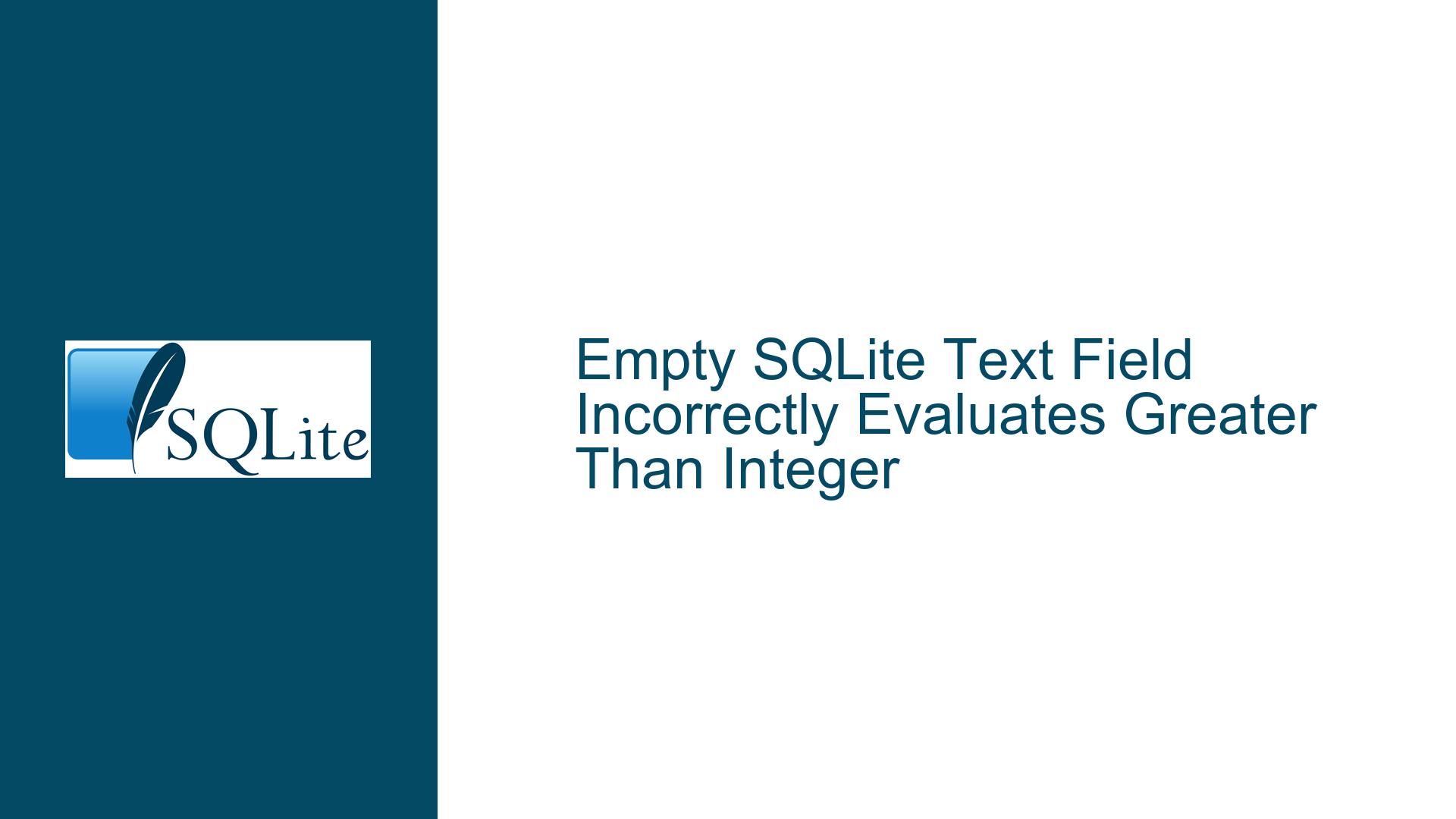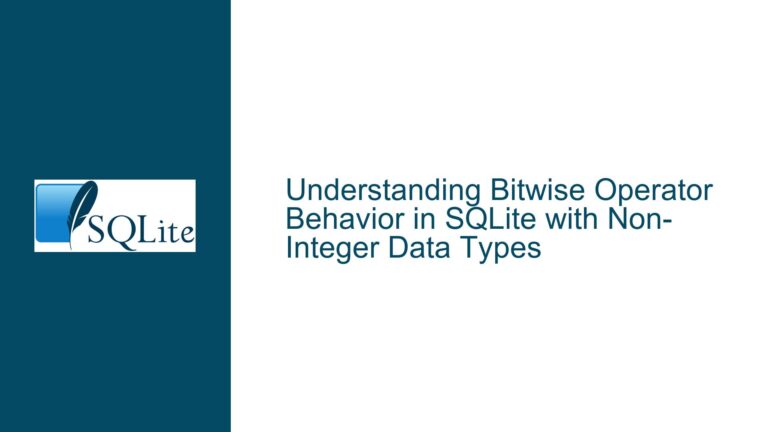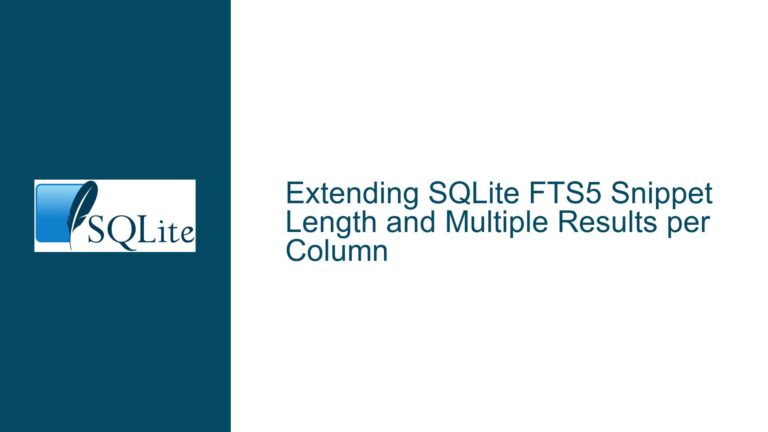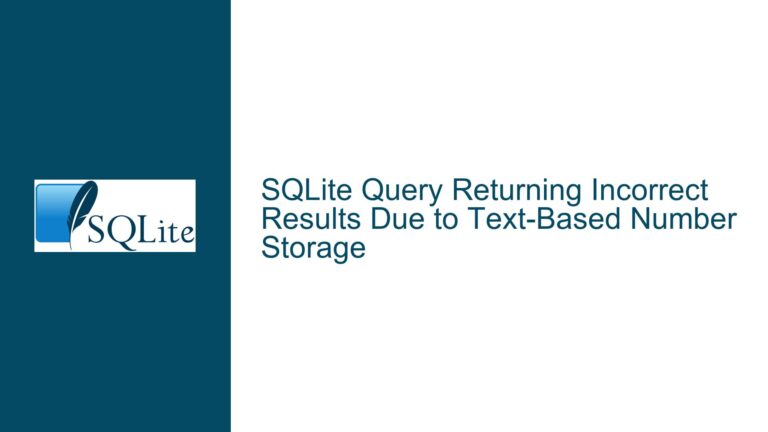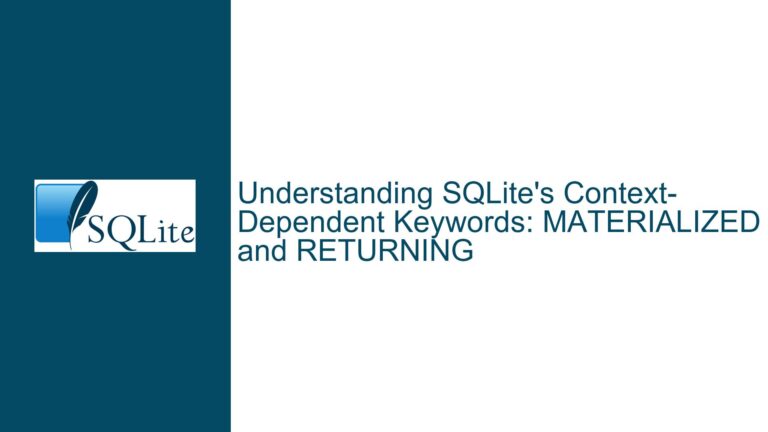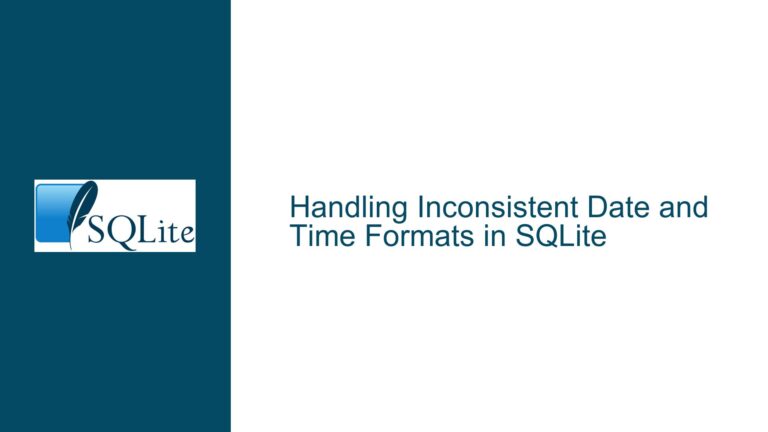Empty SQLite Text Field Incorrectly Evaluates Greater Than Integer
Understanding SQLite’s Empty Text vs. Integer Comparison Behavior
Issue Overview: Empty Text Fields vs. Numeric Comparisons in SQLite
A user encountered unexpected results when querying an SQLite database where an empty checkinTime field (intended to store integers) was being evaluated as greater than a specific integer value. The schema defines checkinTime as an INTEGER column, but the query SELECT id, checkinTime FROM treatments WHERE checkinTime >= 1645311600000 returned a row with an empty checkinTime. This contradicts expectations because empty values are often assumed to behave like NULL or zero in numeric contexts.
The root of the problem lies in SQLite’s dynamic type system and storage class hierarchy. Unlike strictly typed databases, SQLite allows any column (regardless of declared affinity) to store values of any storage class: NULL, INTEGER, REAL, TEXT, or BLOB. When comparing values of different storage classes, SQLite follows deterministic rules. Specifically, a TEXT value (even an empty string) is always considered greater than an INTEGER or REAL value. This behavior is documented but counterintuitive for developers expecting implicit type conversion or affinity-based coercion.
In the example provided, the empty checkinTime was stored as a TEXT value (empty string ''), not as an INTEGER or NULL. The comparison '' >= 1645311600000 evaluates to 1 (true) because the empty string’s storage class (TEXT) outranks the numeric literal’s storage class (INTEGER). This violates the user’s expectation that an empty field would behave like NULL (which is always less than other values) or zero.
Possible Causes: Mismatched Storage Classes and Affinity Misconceptions
Implicit Text Storage in INTEGER Columns:
Despite declaringcheckinTimeasINTEGER, SQLite does not enforce strict type checking. If an empty string ('') is inserted into this column, it is stored asTEXT. This often happens when applications insert values without explicit type validation (e.g., using string placeholders in ORM frameworks or bulk imports from text-based sources like CSV files).Comparison Rules Across Storage Classes:
SQLite’s comparison logic prioritizes storage class over value content. The hierarchy is:
NULL<INTEGER/REAL<TEXT<BLOB.
Thus, anyTEXTvalue (including'') compared to anINTEGER/REALwill evaluate as greater, regardless of the numeric value. This is why'' >= 1645311600000returns1.NULL vs. Empty String Confusion:
Developers often conflateNULL(absence of a value) with empty strings (''). If thecheckinTimefield was intended to represent "unset" or "missing" values,NULLwould have been semantically appropriate. However, inserting''instead ofNULLleads to unexpected behavior in numeric comparisons.Affinity Coercion Limitations:
SQLite’s type affinity system attempts to convert values to a column’s declared affinity before storage, but this coercion is not exhaustive. For example, inserting''into anINTEGERcolumn does not convert it toNULLor0; it remainsTEXT. Affinity rules only apply during insertion if the value can be losslessly converted. Since''cannot be converted to an integer without data loss (it’s not a numeric string), it retains itsTEXTstorage class.
Troubleshooting Steps, Solutions & Fixes
Step 1: Diagnose Storage Classes in Existing Data
Identify the actual storage class of checkinTime values using typeof():
SELECT id, checkinTime, typeof(checkinTime) FROM treatments WHERE checkinTime >= 1645311600000;
If the result shows typeof(checkinTime) as text, the issue is confirmed: empty strings are stored as TEXT, not INTEGER or NULL.
Step 2: Correct Data Insertion Logic
Modify application code or import scripts to ensure numeric values are inserted as integers. For example:
- Use parameterized queries with typed placeholders (e.g., Python’s
sqlite3module allows specifyinginttypes). - Replace empty strings with
NULLfor unset values:INSERT INTO treatments (..., checkinTime) VALUES (..., NULL);
Step 3: Clean Up Existing Data
Update existing checkinTime entries with empty strings to NULL:
UPDATE treatments SET checkinTime = NULL WHERE checkinTime = '';
If empty strings were intended to represent a default value (e.g., 0), cast them explicitly:
UPDATE treatments SET checkinTime = 0 WHERE checkinTime = '';
Step 4: Enforce Data Integrity
Prevent future mismatches using schema constraints:
- STRICT Tables (SQLite 3.37+):
CREATE TABLE treatments (..., checkinTime INTEGER) STRICT;This ensures
checkinTimeonly acceptsINTEGER,NULL, or values coercible toINTEGERwithout data loss. - CHECK Constraints:
CREATE TABLE treatments ( ..., checkinTime INTEGER CHECK (typeof(checkinTime) IN ('integer', 'null')) );
Step 5: Adjust Query Logic
If checkinTime must remain TEXT, explicitly cast it to INTEGER during comparison:
SELECT id, checkinTime FROM treatments WHERE CAST(checkinTime AS INTEGER) >= 1645311600000;
Note: This will ignore non-numeric TEXT values (returning 0 for ''), which may or may not align with requirements.
Step 6: Use COALESCE for Default Handling
Treat NULL as a specific default value in queries:
SELECT id, checkinTime FROM treatments WHERE COALESCE(checkinTime, 0) >= 1645311600000;
Final Recommendation:
Use NULL for missing or unset numeric values and leverage STRICT tables or CHECK constraints to enforce type integrity. This aligns storage behavior with developer expectations and avoids ambiguous comparisons.
